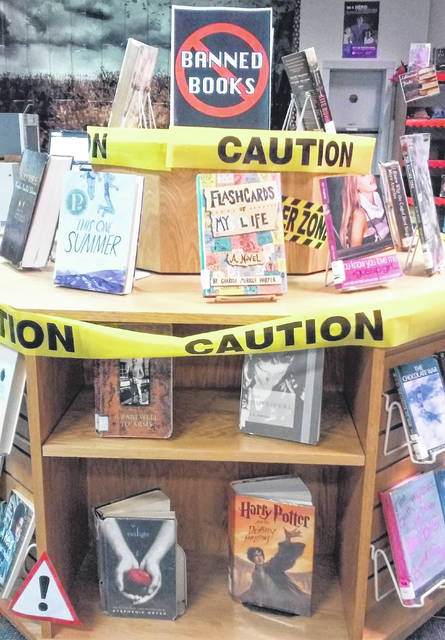
“The Great Gatsby,” “The Grapes of Wrath,” “Gone with the Wind” and The Holy Bible all have one thing in common: at one time or another in the nation’s history, they were all banned books, according to the American Library Association.
“’Banned Books Week,” observed Sept. 23-29, brings notice to all the books that over the years people have had problems with,” Deb Wise with the Greenfield library told The Times-Gazette. “And we as librarians should never try to influence what people read since that should be a free choice of our patrons.”
According to Wise, people have problems with books that are political or contain political commentary, while others dislike the graphic or offensive language that may appear.
“I remember a few years back there was complaining about a Dr. Seuss book, believe it or not, ‘The Lorax’” she said. “A lot of people thought it was more political commentary than a children’s book.”
Elaine Williams, branch manager of the Lynchburg library, remembered another children’s book being the target of a challenge for removal.
“There was a time when a ‘Curious George’ book was complained about because of a scene where a truck was driving down a road and when they stopped, Curious George got in with two strangers and they drove off,” she said. “We had a parent complain about it, saying it was teaching kids the wrong message about safety.”
Two formerly banned books currently being read in the Lynchburg-Clay School District are “Black like Me” by John Howard Griffin and “To Kill a Mockingbird” by Harper Lee.
The latter wasn’t banned, but did run afoul of some parents in the Hillsboro City School District, and was challenged more than a decade ago.
Jennifer West is director of all the Highland County District Libraries, and she remembered being in attendance at several of the school board meetings then.
“It was challenged by some parents who took exception to the fact that their children were being asked to read a book that had the N-word in it,” she said.
The remedy to the problem, West said, was to make the book an elective, so that those that found it offensive weren’t forced to read it and could choose a different title.
West said there were some people who felt there was nothing in the book that condoned racism or racial discrimination, and that it was appropriate for the time period that it was both written and set in.
Placing a book in that context is important, according to Melinda McGee, manager of the Leesburg library.
“I think you have to read them in context, especially something that was written in their contemporary time, like ‘Huckleberry Finn,’” she said. “In Mark Twain’s time, the N-word was as much a derogatory slur then and it is today, and they knew that back then.”
McGee said that certain parts of Twain’s classic are very sympathetic to the plight of the African American culture, and that was the reason some states in the South banned it.
“It had the same problem that ‘To Kill a Mockingbird’ did,” she said. “You found yourself rooting for the innocent black man, and some people didn’t like that.”
One of West’s favorite instances of a book being banned came from a foreign country, and it had nothing to do with politics, race, sex or foul language.
“’Alice’s Adventures in Wonderland’ was written way back in 1865,” she said, “and it was banned in China, as it turns out, because many of the characters are animals that were portrayed on the same intelligence level as humans, and of all things, the Chinese found that to be offensive.”
The only challenges she’s had at the Hillsboro library had to do with parents questioning why certain books were in the children’s section, claiming that the subject matter was too mature.
There have been times when an irate parent came to the Lynchburg library and complained about a book on the shelf there.
“The graphic novels we have today used to be called comic books,” Williams said, “and these are the ones featuring super heroes like the X-Men, Spiderman and the like, and they used to be next to the children’s area.”
Williams said that some parents complained about the violence and the scant clothing of the female characters found in them, and that they didn’t feel they should be in the same place as other graphic novels that featured children’s cartoon characters.
Above all, she said, parental involvement, not censorship, should guide a child’s choice of books.
“I would let my daughter read it and then have a discussion with her,” she said. “Parents should be involved and explain why they think something is not appropriate. There may be an image in that book that would stick in her mind and give her nightmares, and as a parent it may be something that goes against what we believe and find inappropriate in our household.”
In McGee’s eyes, the whole concept of book banning is counterproductive and in the end only makes people desire it more.
“If we were just more reasonable people most of the time, a lot of our problems would go away,” she said. “But a lot of people tend to have this ‘line in the sand’ attitude about things… But that’s just my opinion.”
Reach Tim Colliver at 937.402.2571


